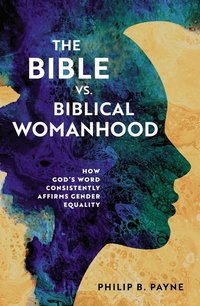 The Bible vs. Biblical Womanhood:
The Bible vs. Biblical Womanhood:
How God’s Word Consistently Affirms Gender Equality
DETAILS: Publisher: Zondervan Publication Date: April 04, 2023 Format: Paperback Length: 183 pg. Read Date: May 14-29, 2023

The Back of the Book Says
A biblical defense of egalitarianism
In The Bible vs. Biblical Womanhood, New Testament scholar Philip B. Payne shows how Scripture affirms gender equality in the church and in the home. This issue is important because it affects the freedom of Christians to proclaim the gospel and advance God’s kingdom. Payne carefully examines each Bible passage alleged to teach gender hierarchy and demonstrates that the Bible does not endorse gender hierarchy but instead emphasizes:
- The Holy Spirit gifting all believers for ministry
- The oneness of the body of Christ (the church) and the priesthood of all believers
- Humility, service, and mutual submission required of all believers
Payne concludes each chapter by defending his position by providing detailed answers to common objections.
The Bible vs. Biblical Womanhood is for those struggling to reconcile the Bible’s seemingly contradictory teachings about man and woman. Readers will come away with greater confidence in the reliability of Scripture’s consistent, harmonious message of gender equality.
What’s This Look Like?
Essentially Payne looks at 11 Biblical passages that are frequently used to support complementarian/patriarchal positions in the church. He critiques those interpretations and offers his own. The critical portions of each chapter are smaller than the positive portions, I should stress. Payne’s focus is on explaining and defending his interpretations.
Some Problems
I’m not evaluating Payne’s arguments or positions—that’s not what this blog is about. But as a reader, there were a few flags raised that made it hard for me to take the work as seriously as I might otherwise.
So, I got a little uneasy when in one of the introductions, Payne referred to his “discoveries” in his studies of the Biblical texts. At this stage of Church History discoveries are pretty suspect.
What made me really suspicious of Payne’s work was the way he’d slip between Bible translations frequently—essentially you get the idea he cherry-picked translations to support his arguments for him, rather than sticking with one translation (or translating each passage himself) and then explaining his issues with a word choice or two—on the whole, I find that a lot more convincing.
Two of his most pivotal chapters utilize a lot of textual criticism prior to his interpretation of the text—Payne does a thorough job of explaining that criticism and then constructs his argument. I don’t know enough to evaluate his critical work there—I find both arguments plausible, but his positions rely so heavily on them that multiple chapters would crumble without them. I don’t know if his positions can stand without him being right on these points.
I’d love to read good scholarly reactions to his textual critical arguments, I wonder how much water they hold.
So, what did I think about The Bible vs. Biblical Womanhood?
I really liked a lot of the book—and found myself agreeing with most of his critiques of complementarianism/patriarchal positions. I was able to appreciate many—maybe most—of his positive arguments, I don’t think I was won over totally by any, but I didn’t expect that to happen off of one popular-level book (nor was I looking for it).
The book was well-written, engaging, and clear. Payne takes complicated (and almost convoluted) ideas and expresses them in a way that anyone can get their hands around. And even if you’re not convinced—but I can see him convincing those who are looking for it—you will understand the positions, and see a lot of things that look easy are a lot murkier, and require wisdom to work through.
I do think this is worth the time to read and think through, I’m glad I did. I would read other things by Payne in the future. I’d love to hear what other people think.

This post contains an affiliate link. If you purchase from it, I will get a small commission at no additional cost to you. As always, the opinions expressed are my own.
![]()


